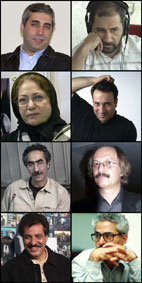
-
Iranian Filmmakers in US
 A visit to Iran by Board members of Academy of Motion Pictures Arts and Sciences (Oscar) in early spring was among the most important artistic developments in the country. It was important because since the victory of the Islamic Revolution, no American artist had officially travelled to Iran. The trip was surrounded by controversies and although it provided a good ground for cultural interactions between the two countries’ filmmakers, some circles protested to it. During the visit, two specialized meetings were held attended by Oscar Board members and Iranian filmmakers, which greatly echoed in the Iranian print media. The American visitors also toured some ancient Iranian cities. Back in the United States, they talked about hospitality of Iranians and positive results of their trip. Almost six months after that trip, the American group invited 10 Iranian filmmakers to visit the United States to get abreast of filmmaking conditions and facilities in that country. A visit to Iran by Board members of Academy of Motion Pictures Arts and Sciences (Oscar) in early spring was among the most important artistic developments in the country. It was important because since the victory of the Islamic Revolution, no American artist had officially travelled to Iran. The trip was surrounded by controversies and although it provided a good ground for cultural interactions between the two countries’ filmmakers, some circles protested to it. During the visit, two specialized meetings were held attended by Oscar Board members and Iranian filmmakers, which greatly echoed in the Iranian print media. The American visitors also toured some ancient Iranian cities. Back in the United States, they talked about hospitality of Iranians and positive results of their trip. Almost six months after that trip, the American group invited 10 Iranian filmmakers to visit the United States to get abreast of filmmaking conditions and facilities in that country.
-
Iranian Cinema Dinner Banquet
The 13th Iranian Cinema Celebration was canceled. Although Farhad Towhidi (screenwriter and deputy director of House of Cinema) had been assigned as secretary of the celebration since many months ago and, as usual, the best works of the Iranian cinema were to be chosen in various fields, developments following presidential election caused directorate of House of Cinema to announce that it was not ready to mark the occasion. Every year, a celebration is held on September 12, which is the national Cinema Day in Iran, in which judges give their final views on the last year’s movies and selected participants receive special statue of the celebration. The celebration has turned into the main rival for Fajr International Film Festival in recent years.
-
CIFEJ in Tehran
 Tehran played host to a meeting of CIFEJ (Centre International de Film pour l'enfance et La Jeunesse) board of directors on April 18-23. Mohsen Chiniforoushan, managing director of the Institute for the Intellectual Development of Children and Young Adults and vice president of CIFEJ, announced that in a meeting which was held in Taiwan in the middle of July, Iran’s proposal to move central office of the organization to Tehran had been discussed. During 54 years of activity, CIFEJ has been based in Canada and France. Apart from Iran, other countries including Germany and Taiwan are willing to host CIFEJ. Tehran played host to a meeting of CIFEJ (Centre International de Film pour l'enfance et La Jeunesse) board of directors on April 18-23. Mohsen Chiniforoushan, managing director of the Institute for the Intellectual Development of Children and Young Adults and vice president of CIFEJ, announced that in a meeting which was held in Taiwan in the middle of July, Iran’s proposal to move central office of the organization to Tehran had been discussed. During 54 years of activity, CIFEJ has been based in Canada and France. Apart from Iran, other countries including Germany and Taiwan are willing to host CIFEJ.
-
Directors’ Night
Every year, a number of cinema guilds in Iran (like directors, actors, and critics) hold a ceremony to report on annual performance of their respective guilds and to pay tribute to their prominent members. This was the rule up to last year. This year, however, the death of the late Iranian director, Seifollah Dad, overshadowed the event and a major part of the ceremony was special to his commemoration. Dad was very influential in the establishment of film associations and during his term as deputy minister of culture for cinema affairs he took basic steps to support filmmakers. Therefore, he is constantly mentioned as one of the best cultural authorities of post-revolution era. During directors’ night, Mehdi Karampour, Mohammad Ali Najafi, Alireza Davoudnejad, and Mohammad Mehdi Asgarpour addressed the audience on the personality of Seifollah Dad.
-
Jumong in Iran
 The Iranian state television has many considerations when purchasing and broadcasting foreign series the most important of which is how actresses are clothed. Therefore, historical productions of Australia and Canada have been favorites of the Iranian television because female characters are suitably clad. The second criterion is that their subjects should not be against religious and moral rules of the Iranian society. About two decades ago, a Japanese series was aired on the television in which the main character was followed from childhood up to her death. It was greatly welcomed by Iranians and made state television a regular customer of oriental series. In addition to Japanese series, television productions of South Korea have been also on the list. The Iranian state television has many considerations when purchasing and broadcasting foreign series the most important of which is how actresses are clothed. Therefore, historical productions of Australia and Canada have been favorites of the Iranian television because female characters are suitably clad. The second criterion is that their subjects should not be against religious and moral rules of the Iranian society. About two decades ago, a Japanese series was aired on the television in which the main character was followed from childhood up to her death. It was greatly welcomed by Iranians and made state television a regular customer of oriental series. In addition to Japanese series, television productions of South Korea have been also on the list.
-
Roaming in the Mist
 Bahram Tavakkoli is among young Iranian directors who have started with making short films. Before making his first feature, Barefoot in Paradise, he had become renowned for his short films. His first film was about a religious person who voluntarily enters a quarantine center of AIDS patients to assist its staff. When facing a number of patients and befriending them, he doubts his own beliefs. This film won a number of main prizes after its first screening in Fajr Festival. Three years later, Tavakkoli has made his second feature on the basis of a different story. Roaming in the Mist is about a young composer who marries his beloved woman; a stage performer. Following marriage, they face many problems which cause the man to lose his job. His wife also leaves him. Shahab Hosseini and Leila Hatami have been cast in the main roles; they were chosen as the best actor and actress in the latest edition of Fajr Festival. Bahram Tavakkoli is among young Iranian directors who have started with making short films. Before making his first feature, Barefoot in Paradise, he had become renowned for his short films. His first film was about a religious person who voluntarily enters a quarantine center of AIDS patients to assist its staff. When facing a number of patients and befriending them, he doubts his own beliefs. This film won a number of main prizes after its first screening in Fajr Festival. Three years later, Tavakkoli has made his second feature on the basis of a different story. Roaming in the Mist is about a young composer who marries his beloved woman; a stage performer. Following marriage, they face many problems which cause the man to lose his job. His wife also leaves him. Shahab Hosseini and Leila Hatami have been cast in the main roles; they were chosen as the best actor and actress in the latest edition of Fajr Festival.
-
Whisper with the Wind
 After The Wind Will Carry Us (Abbas Kiarostami), whose story went on in the Iranian Kordestan, Iranian filmmakers were attracted to what happened in that region after the fall of Saddam. Samira Makhmalbaf made The Blackboards and later on, local filmmakers started professional careers. One of the most famous of the latter group was Bahman Qobadi, whose first feature called A Time for the Drunken Horses, won a Camera d’Or from Cannes Film Festival. The trend has continued. Shahram Alidi is another Kurd director of Iran whose first feature, Whisper with the Wind, has taken part in Cannes and won two prizes from non-competitive sections. Alidi has already made many short films and has won prizes from domestic festivals. After The Wind Will Carry Us (Abbas Kiarostami), whose story went on in the Iranian Kordestan, Iranian filmmakers were attracted to what happened in that region after the fall of Saddam. Samira Makhmalbaf made The Blackboards and later on, local filmmakers started professional careers. One of the most famous of the latter group was Bahman Qobadi, whose first feature called A Time for the Drunken Horses, won a Camera d’Or from Cannes Film Festival. The trend has continued. Shahram Alidi is another Kurd director of Iran whose first feature, Whisper with the Wind, has taken part in Cannes and won two prizes from non-competitive sections. Alidi has already made many short films and has won prizes from domestic festivals.
-
The Man Who Ate His Cherries
 This is about a man who works for a low salary at a tire manufacturing company. The court has condemned him to pay his wife’s marriage portion and Reza is trying to get that money. Finally, he remembers that another worker had lost a finger in work and this gives him a new idea how to make that money. Peiman Haqqani, the director, is not a known figure in the Iranian cinema. He is interested in independent cinema and his first feature was in black and white. It is clear that The Man Who Ate His Cherries has not been made for public screening in Iran and production costs have been kept down. Such films are not usually accompanied with much ado and nobody is very sensitive about following news on independent films save for those which are made by a famous director. This is about a man who works for a low salary at a tire manufacturing company. The court has condemned him to pay his wife’s marriage portion and Reza is trying to get that money. Finally, he remembers that another worker had lost a finger in work and this gives him a new idea how to make that money. Peiman Haqqani, the director, is not a known figure in the Iranian cinema. He is interested in independent cinema and his first feature was in black and white. It is clear that The Man Who Ate His Cherries has not been made for public screening in Iran and production costs have been kept down. Such films are not usually accompanied with much ado and nobody is very sensitive about following news on independent films save for those which are made by a famous director.
|
|
October, 2023
September, 2023
January, 2017
December, 2015
December, 2014
January, 2013
July, 2012
August, 2011
December, 2010
June, 2010
January, 2010
October, 2009
May, 2009
February, 2009
January, 2009
November, 2008
October, 2008
July, 2008
March, 2008
January, 2008
December, 2007
November, 2007
September, 2007
|
|
|

